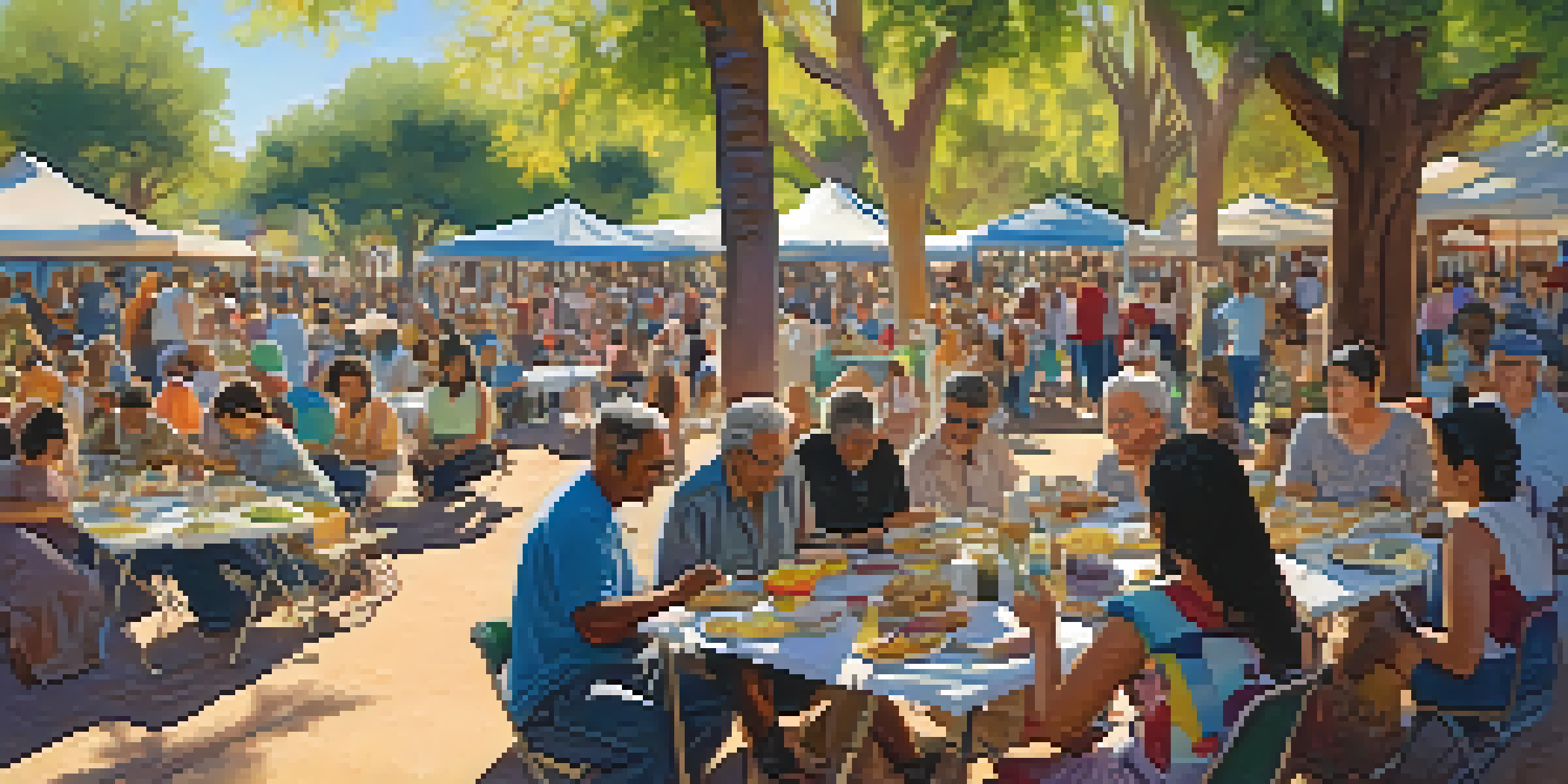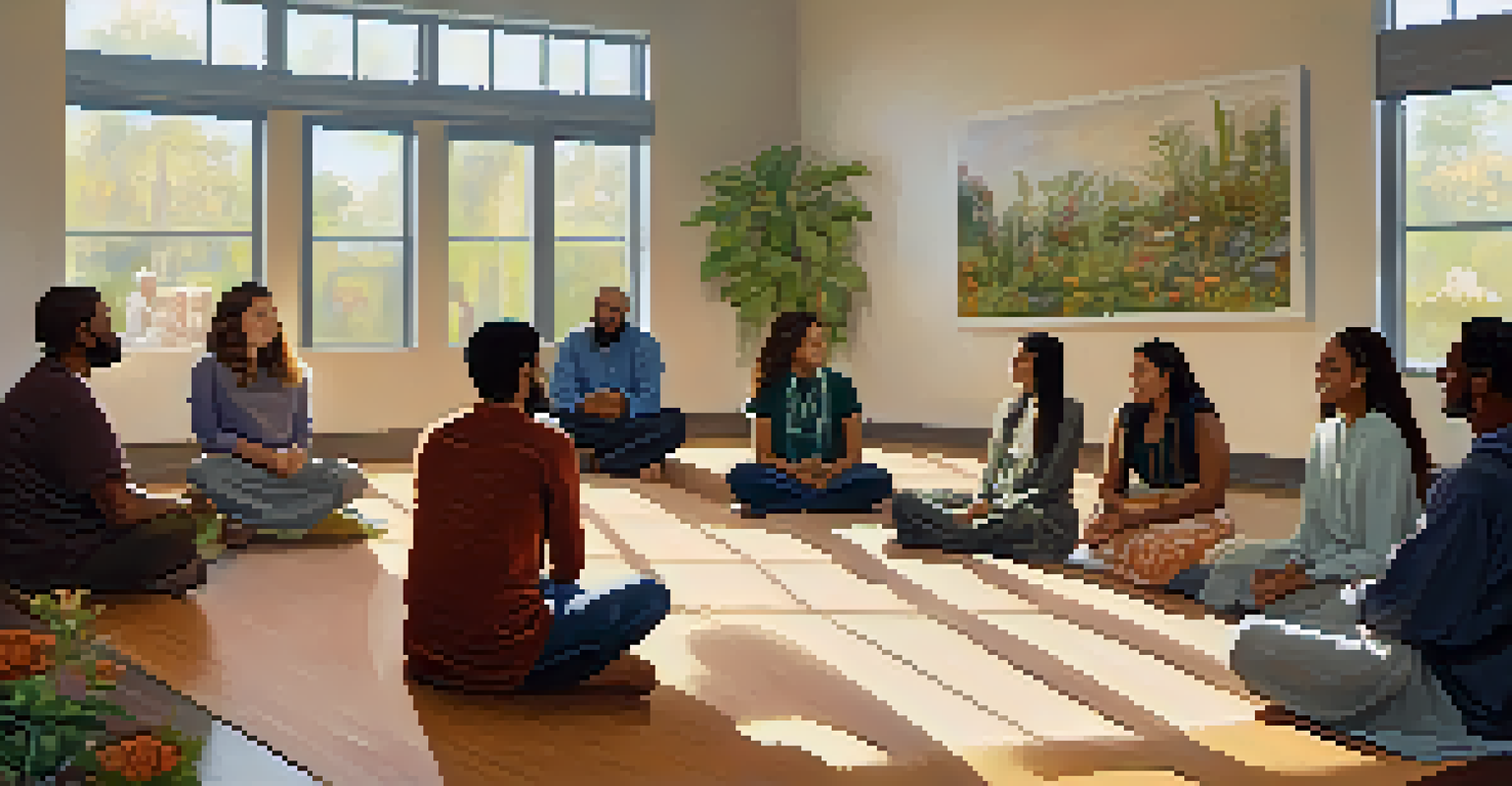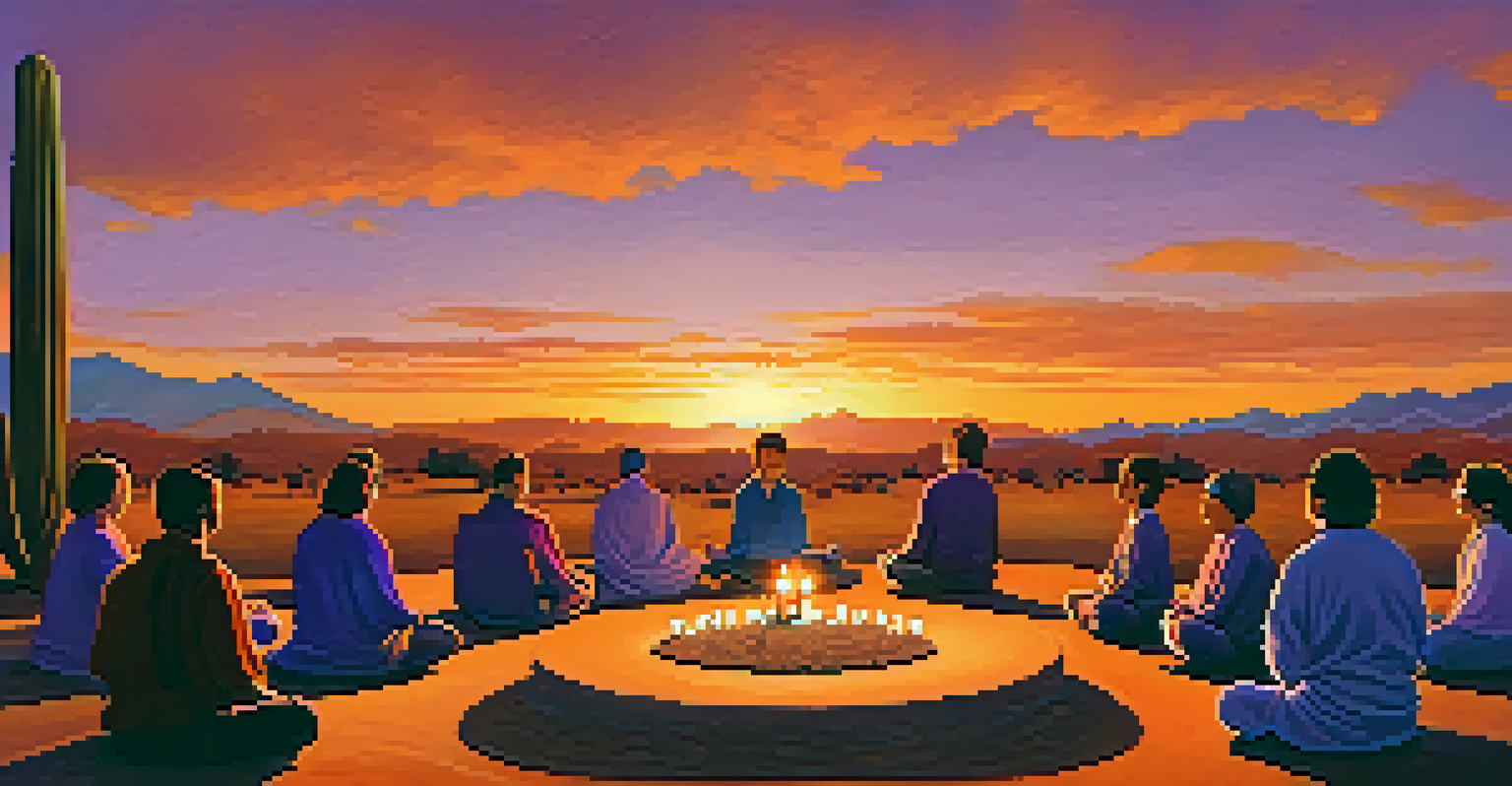The Role of Faith in Tucson's Community Life

Faith as a Foundation for Community Bonds
In Tucson, faith acts as a cornerstone for building strong community ties. Many residents find common ground through shared beliefs, creating a sense of belonging that transcends individual differences. This bond often manifests in collaborative projects that serve the greater good, such as food drives and community clean-ups.
Faith is taking the first step even when you don't see the whole staircase.
Churches, synagogues, and other places of worship frequently become hubs of activity where people gather not just for spiritual growth, but also for social interaction. These gatherings foster friendships and support networks that can be crucial during challenging times. For instance, community dinners hosted by local faith groups often draw in diverse attendees, reinforcing connection and understanding.
Moreover, the collaborative spirit among different faith organizations enhances Tucson's rich tapestry of cultural diversity. By working together on initiatives, they promote inclusivity and mutual respect, which are vital for a harmonious community. This interfaith cooperation showcases how faith can unite rather than divide, reflecting the city’s vibrant character.
The Influence of Faith on Local Charities and Services
Faith-based organizations play a pivotal role in providing essential services to Tucson's residents. Many local charities, driven by their spiritual missions, focus on alleviating poverty, hunger, and homelessness. These organizations often mobilize volunteers to help in shelters, food banks, and community outreach programs, demonstrating the tangible impact of faith on service delivery.

For example, the Interfaith Community Services in Tucson exemplifies how faith can drive charitable efforts. This organization brings together various faith groups to address the needs of the community through a variety of programs, from financial assistance to job training. Their collaborative approach not only meets immediate needs but also empowers individuals to improve their circumstances.
Faith Strengthens Community Bonds
In Tucson, shared faith creates a sense of belonging that fosters collaboration and support among diverse residents.
Additionally, faith-based charities often foster a spirit of giving among their congregants. Encouraging members to contribute their time and resources creates a cycle of generosity that strengthens the community as a whole. As people share their blessings, they build a culture of support and compassion that resonates throughout Tucson.
Spiritual Events and Their Community Impact
In Tucson, spiritual events are more than just religious observances; they serve as community gatherings that enhance social cohesion. Festivals, prayer services, and interfaith dialogues invite participation from all walks of life, promoting understanding and dialogue among diverse groups. These events often celebrate cultural heritage while reinforcing shared values.
The greatness of a community is most accurately measured by the compassionate actions of its members.
An example is the annual Tucson Festival of Books, which often includes sessions on spirituality and faith. These sessions not only provide a platform to explore religious themes but also attract a diverse audience, fostering conversations that enrich the community. Such events highlight how faith can spark curiosity and connection in an engaging environment.
Moreover, these gatherings often lead to initiatives that address community needs. When local faith leaders come together, they can inspire collective action towards social justice, education, and health initiatives. This collaborative effort showcases how spiritual events can ripple out to create meaningful change.
Faith's Role in Promoting Social Justice
In Tucson, faith is often a driving force behind social justice movements. Religious leaders and congregations play crucial roles in advocating for the marginalized and voiceless. By leveraging their platforms, they raise awareness about issues like poverty, racial inequality, and immigration rights, calling the community to action.
For instance, various faith groups actively participate in rallies and discussions aimed at promoting equality and human rights. These efforts not only reflect the moral teachings within their traditions but also unite individuals from different backgrounds in a common cause. Such actions underline the belief that faith extends beyond the walls of worship and into the streets where justice is sought.
Faith Drives Local Charitable Efforts
Faith-based organizations are crucial in providing essential services and fostering a culture of generosity within the community.
Additionally, many faith-based organizations offer resources and support for those facing discrimination or hardship. By creating safe spaces for dialogue and healing, they foster an environment conducive to understanding and reconciliation. This commitment to social justice exemplifies how faith can be a powerful catalyst for positive change in Tucson.
The Interplay of Faith and Education in Tucson
Faith and education often intersect in Tucson, with many religious institutions offering educational programs that extend beyond spiritual teachings. Schools affiliated with various faith communities focus on holistic development, combining academic excellence with moral and ethical instruction. This approach nurtures well-rounded individuals who are prepared to contribute positively to society.
For example, Catholic schools in Tucson are known for their commitment to both academic rigor and character building. They emphasize values like respect, service, and responsibility, instilling a sense of purpose in students. The impact of this educational philosophy can often be seen in the graduates who go on to serve their communities in various capacities.
Moreover, faith-based educational initiatives often engage the wider community through tutoring programs and scholarships. These efforts not only enhance educational opportunities for underprivileged youth but also strengthen ties between different community segments. By fostering an environment that values learning and spirituality, Tucson's faith institutions contribute significantly to the educational landscape.
Faith's Role in Mental Health and Wellness
Mental health is an essential aspect of community well-being, and faith plays a critical role in providing support in Tucson. Many individuals turn to their faith communities for solace, guidance, and a sense of belonging during challenging times. The emotional support found within these groups can be a vital lifeline for those struggling with mental health issues.
For instance, various congregations offer counseling services and support groups that address mental health concerns from a spiritual perspective. These resources often combine psychological principles with faith-based teachings, providing a holistic approach to healing. This integration helps individuals feel understood and supported on their journey to recovery.
Faith Promotes Social Justice Initiatives
Religious leaders in Tucson advocate for marginalized groups, using their platforms to promote equality and inspire community action.
Additionally, faith leaders are increasingly becoming advocates for mental health awareness, helping to destigmatize these conversations within their communities. By openly discussing mental health, they encourage individuals to seek help without fear of judgment. This proactive stance not only promotes healing but also strengthens the overall resilience of Tucson's community.
Building a Brighter Future Through Faith
The future of Tucson's community life remains brightly illuminated by the role of faith. As residents continue to engage with their spiritual beliefs, they also foster a culture of compassion, cooperation, and resilience. This commitment to collective well-being creates a positive feedback loop that benefits everyone.
Faith leaders and organizations are increasingly stepping up to address contemporary challenges, from climate change to social inequality. By rallying community members around these pressing issues, they inspire action that aligns with their shared values. This proactive approach not only enriches the community but also sets a powerful example for future generations.

Ultimately, the enduring influence of faith in Tucson's community life highlights the potential for transformation and growth. As individuals come together to support one another through shared beliefs and values, they create a vibrant, connected community that is better equipped to face the future.